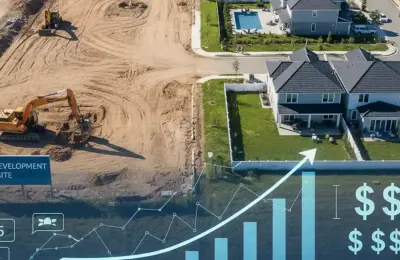
How to Become a Real Estate Agent in the USA: A Complete Step-by-Step Guide

Dreaming of a real estate career in the United States? The American market is one of the largest and most dynamic in the world, offering immense potential for success. However, just like in Australia, licensing requirements are set at the state level, not federal.
This SEO-optimized article will provide you with a clear, universal step-by-step plan to begin your journey as a real estate agent in any US state.
Key Feature: State-Level Licensing
To sell real estate in the US, you must hold a Real Estate Salesperson License for the state where you operate. Requirements vary significantly: from 40 hours of pre-licensing education in Vermont to 210 hours in Texas or 135 hours in California.
Your first and most crucial step is to determine your state's specific requirements.
7 Universal Steps to Getting Your License in the USA
Despite differences in the number of hours, the general process for obtaining a license in most US states is consistent.
Step 1: Meet Basic Eligibility Requirements
You must meet core criteria before applying for a license:
Age: Typically 18 years old (some states require 19 or 21).
Education: Hold a High School Diploma or its equivalent (GED).
Work Eligibility: You must be legally authorized to work in the US.
Step 2: Complete Mandatory Pre-Licensing Education
These are specialized courses covering key topics: real estate law, contracts, financing, property appraisal, and ethics.
Hours of Study: The number of hours varies from 40 to over 200 depending on the state (e.g., 75 hours in New Jersey, 63 hours in Florida).
Schools: You must complete the education at a state-accredited school (online or in-person).
Course Exam: Most courses conclude with a final exam that you must pass to receive your Certificate of Completion.
Step 3: Apply to Take the State Licensing Exam
After successfully completing the pre-licensing education, you apply to the relevant State Real Estate Licensing Authority (e.g., the Real Estate Commission).
Application Package: This includes a completed application form, fee payment, and the course completion certificate.
Step 4: Pass a Background Check
All states require candidates to undergo a background check and fingerprinting. This process ensures you are a "fit and proper person."
Criminal History: Felonies or certain other offenses may lead to license denial, though each case is reviewed individually.
Step 5: Pass the State Licensing Exam
The state exam is the most critical step. It typically consists of two parts:
National Portion: Tests general knowledge of real estate practice and federal law.
State Portion: Tests knowledge of laws, rules, and forms specific to your state.
Difficulty: The exam is challenging and often requires re-testing. It is vital to dedicate sufficient time to preparation.
Step 6: Affiliate with a Licensed Broker
In the US, no new agent can work independently. You must join a Brokerage Firm that holds an active license in your state.
Broker's Role: The broker acts as your mentor, provides legal oversight for your transactions, and is responsible for your actions.
Choosing a Brokerage: Carefully select a brokerage that offers the best support, training, and commission splits that align with your career goals.
Step 7: Finalize Your License Application
After successfully passing the exam and choosing a broker, you submit the final license application along with the broker's signature (confirming your employment) and payment of the final fees.
How Much Does It Cost to Become an Agent?
The total cost of obtaining a license varies, but generally includes:
| Expense | Estimated Cost |
|---|---|
| Pre-licensing Education | $300 – $800 |
| State Exam Fee | $100 – $300 |
| Background Check/Fingerprints | $50 – $150 |
| Licensing Application Fee | $100 – $400 |
| Total (Estimated) | $550 – $1,650+ |
Career Advancement: From Agent to Broker
Once licensed as a Salesperson, you are a full agent. To advance your career and open your own firm, you must become a Broker.
Broker Requirements: This usually requires 2–3 years of experience working as a licensed agent and additional education (Broker Pre-Licensing Education).
Essential Tips for New Agents
Networking: Join the National Association of Realtors (NAR) to access resources and the ability to use the title "REALTOR®".
Specialization: Consider specializing in areas like Residential Real Estate, Commercial Real Estate, or Property Management.
Continuing Education (CE): To keep your license active, all states require you to complete mandatory Continuing Education (CE) courses annually or biennially.
News insight
 Nov 18, 2025
Nov 18, 2025
Property Developer Earnings in the US Market: A Comprehensive Overview
Explore how US property developers earn money. Learn about profit margins (Residential vs. Commercia...
 Nov 18, 2025
Nov 18, 2025
What Is a Build-to-Rent (BTR) Development?
Discover what a Build-to-Rent (BTR) development is. Learn about this growing real estate model, its...
 Nov 17, 2025
Nov 17, 2025
Build-to-Rent: Transforming America's Housing Landscape
Explore how the Build-to-Rent (BTR) model is transforming the US housing market. Learn why instituti...
